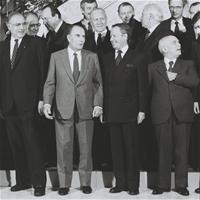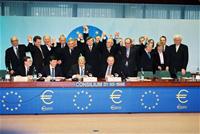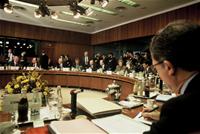Europe between freedom and over-regulation: 20 years later
Ralitsa Kovacheva, September 6, 2010
 This autumn will be difficult for the European Union. Some important decisions must be taken and discussions on the next important decisions have to start. It is expected the October European Council to be "bloody" and after it nothing will be the same. The plans for European economic governance, which should enter into force next year, until recently were considered as an unthinkable step and we are already talking about a new precedent - a common European tax. The debate about EU's budget for the next programming period is running high, in terms of the amount of own resources and the reform of the agricultural policy. And all this, against the background of the fundamental arguments in favour of and against federalism in the Community, as well as state intervention in the free market.
This autumn will be difficult for the European Union. Some important decisions must be taken and discussions on the next important decisions have to start. It is expected the October European Council to be "bloody" and after it nothing will be the same. The plans for European economic governance, which should enter into force next year, until recently were considered as an unthinkable step and we are already talking about a new precedent - a common European tax. The debate about EU's budget for the next programming period is running high, in terms of the amount of own resources and the reform of the agricultural policy. And all this, against the background of the fundamental arguments in favour of and against federalism in the Community, as well as state intervention in the free market.
The European Union is confronted with these dilemmas not since yesterday and not for the first time. And with regard to some of the issues, it was not that long ago, I'm thinking, while reading Margaret Thatcher's memoir about the creation of the Economic and Monetary Union (EMU). It is amazing how, though things have changed significantly over the past 20 years, many of the arguments in favour and against, valid in the late 80's of last century, are so relevant today. This supports the view of many (including Thatcher) that one of the most significant problems of the EU is that many decisions have been taken for purely political reasons, without being filled with the necessary specifics and substance. This does not mean that they were wrong, though.
Margaret Thatcher's point of view is particularly interesting because, as a British  prime minister (1979-1990) and a leader of the Conservative Party, she is one of the most staunchest opponents of federalism in the EU. Although she doesn't approve the European Commission's aspirations for more power and the Community's transformation into a super state, she fully understands why the weaker states do not share her position:
prime minister (1979-1990) and a leader of the Conservative Party, she is one of the most staunchest opponents of federalism in the EU. Although she doesn't approve the European Commission's aspirations for more power and the Community's transformation into a super state, she fully understands why the weaker states do not share her position:
"Someone who doesn't trust the political system or political leaders of his own country, is inevitably more tolerant when markedly intelligent, capable and honest foreigners, such as Mr. Delors (President of the European Commission from 1985 to 1995) tell him how to defend his own interests. Or to put it more simply, if I were Italian [or Bulgarian in our case], perhaps I would prefer a governance from Brussels." (All quotations in the text are translated into English from the Bulgarian edition of the book “The Downing Street Years”)
 The current problems of the euro area can be better understood via the memoir of Ms Thatcher about the first steps towards the Economic and Monetary Union (EMU). She doesn't hide her resistance against the idea of ceding parts of national sovereignty to supranational institutions like the European Commission and European Central Bank (against the creation of which she is strongly against). But recognises that in the light of euro optimism, so rampant at the time, her position was too isolated.
The current problems of the euro area can be better understood via the memoir of Ms Thatcher about the first steps towards the Economic and Monetary Union (EMU). She doesn't hide her resistance against the idea of ceding parts of national sovereignty to supranational institutions like the European Commission and European Central Bank (against the creation of which she is strongly against). But recognises that in the light of euro optimism, so rampant at the time, her position was too isolated.
Beside the national interest, Margaret Thatcher has some purely economic arguments, firstly against United Kingdom's membership to the European Exchange Rate Mechanism (ERM), and secondly (and especially) against EMU accession. According to her, keeping the exchange rate in a narrow band will be expensive for taxpayers because it will require strong interventions on the market. There is no "appropriate" rate for the pound beyond what the market indicates, Thatcher says. And there's no way to cheat the market - a credo in which she has always believed. And she resists all attempts for control over the market, which she defines as socialism.
20 years later, and after the major crisis, the question how far should control be extended over the free market is particularly striking. And the EU remains an advocate of a strict and comprehensive regulation, although it has so far failed to impose its will on a G20 level. However, France is on its way to preside over the G20, with Paris being highly motivated to trigger changes in the direction of stricter regulation in the financial sector. President Sarkozy has already announced that he would work to tighten control on world stock markets and will seek to reduce the exchange rates fluctuations, although not in return for fixed rates. Although not supported by the G20, the EU has already announced the imposition of bank levies in the Community and is advocating the imposition of a financial transaction tax, including in terms of a new own resource to EU's budget.
In this respect the memoir of Margaret Thatcher is also a rewarding source.  In the late 1980s, the deficit in EU's budget becomes increasingly evident, primarily because of the too expensive and inefficient agricultural policy - it has already been reformed once, but this autumn a new broad discussion about its future in the next programming period will take place. On top of this, Thatcher says, Commission President Jacques Delors insists on raising money in regional and social funds. Then, just like today, an increase of the percentage of the own resources in the budget is being proposed to solve the problem, but after many disputes during several European Councils EU leaders agree to certain restrictions and tighter control over the agricultural policy.
In the late 1980s, the deficit in EU's budget becomes increasingly evident, primarily because of the too expensive and inefficient agricultural policy - it has already been reformed once, but this autumn a new broad discussion about its future in the next programming period will take place. On top of this, Thatcher says, Commission President Jacques Delors insists on raising money in regional and social funds. Then, just like today, an increase of the percentage of the own resources in the budget is being proposed to solve the problem, but after many disputes during several European Councils EU leaders agree to certain restrictions and tighter control over the agricultural policy.
Thatcher reveals some curious details from behind the scene about the negotiations and the real reasons behind the positions of the driving forces of the Union - France and Germany. Awaiting general elections, the French “were not burning in desire to impress anyone with stringent measures in agriculture, provided that they would soon need the votes of French farmers”. The situation is similar in Germany, where the results of the Christian Democrats (CDU) are falling because farmers refuse to vote. Thatcher's impression is that Helmut Kohl is ready to do anything “even if this would be at the German taxpayer's expense, just the farmers to be satisfied."
 Thatcher pays much attention to the Franco-German relations, which are important (as they are now) for the direction of EU's development. She writes about "the Franco-German axis with its own federalist and disguised protectionist programme”, which is in total contradiction to her firm belief that Europe would be successful only as a community of sovereign, actively cooperating states, within their single market and opened to the free world market. The notion of France and Germany, however, about the Economic and Monetary (and political) Union is different.
Thatcher pays much attention to the Franco-German relations, which are important (as they are now) for the direction of EU's development. She writes about "the Franco-German axis with its own federalist and disguised protectionist programme”, which is in total contradiction to her firm belief that Europe would be successful only as a community of sovereign, actively cooperating states, within their single market and opened to the free world market. The notion of France and Germany, however, about the Economic and Monetary (and political) Union is different.
"The "political union" was intended to be created together with a monetary union. This was at some point logical. The single currency and the single economic policy ultimately imply a common government. Behind the idea of a political union, however, a special Franco-German plan was hidden. The French wanted to limit the Germany's power and to this end they were planning to create a stronger European Council, which would give greater opportunity for decisions, taken by a majority vote. However, they wanted to increase the powers of the Commission or the European Parliament. The French were federalists not by belief, but by tactical considerations.
The Germans wanted the creation of a "political union" for other reasons and by other means. For them it was partly the price to achieve rapid reunification with Eastern Germany in the desired manner and with all the EU membership benefits, and partly the opportunity to show that the new Germany will not behave like the old one from Bismarck to Hitler. For this cause the Germans were willing to give greater powers to the Commission and were giving utmost importance to increasing the power and prestige of the European Parliament. The Germans were convinced federalists. The French sought a political union, but the German project dominated as Germany was increasingly turning into the senior partner in the Franco-German axis."
Remember the pressure from Paris and Berlin for the separation of the euro area from the other Member States through the imposition of a stricter regime of economic governance, although they hadn't agreed about the details of its institutionalisation and political pressure for sanctions against countries-violators of the Stability and Growth Pact? The two countries are the engine of the idea of imposing stabilisation bank levy and tighter regulation in the financial sector. Recently the French Minister for Budget Francois Barrot announced that Paris was exploring the possibility of tax harmonisation with Germany, because "Germany is a model that should be a source of inspiration for us."
It is interesting also that the condition set by Great Britain for its EMU membership was a full development of the Single Market, which, according to Thatcher is the greatest benefit and significance of unification - an argument, fully supported by the report (from 2010, May) of the former European Commissioner Mario Monti about a relaunch of the single market being a major priority of the EU . Thatcher also insists on the creation of a European Monetary Fund - an idea that has gained popularity at the height of the debt crisis in the eurozone, but did not receive the necessary support.
In her book, Thatcher repeatedly mentions the "devastating consequences"  that the introduction of the single currency would have on the inefficient economies of less developed countries - a fact that today is openly acknowledged by economists and politicians. According to an analysis of the Carnegie Foundation from June 2010, the single currency has given impetus to the development of the strongest economies in the euro area, particularly Germany, but this happened at the expense of the less developed, such as Greece, Spain, Ireland and Portugal, right as Thatcher predicted 20 years ago: "Countries with less developed economies would be destroyed by a single currency, but they hoped to get enough subsidies so that their consent would be justified. The case of Greece was classic. I was used to the "Greek chorus" supporting any ambitious proposal made by Germany.” Today it is clear that the price for such support was too high and whatever these countries have earned in return was literally squandered.
that the introduction of the single currency would have on the inefficient economies of less developed countries - a fact that today is openly acknowledged by economists and politicians. According to an analysis of the Carnegie Foundation from June 2010, the single currency has given impetus to the development of the strongest economies in the euro area, particularly Germany, but this happened at the expense of the less developed, such as Greece, Spain, Ireland and Portugal, right as Thatcher predicted 20 years ago: "Countries with less developed economies would be destroyed by a single currency, but they hoped to get enough subsidies so that their consent would be justified. The case of Greece was classic. I was used to the "Greek chorus" supporting any ambitious proposal made by Germany.” Today it is clear that the price for such support was too high and whatever these countries have earned in return was literally squandered.
 In her attempts to oppose the single currency, Thatcher persistently argues that the EMU means economic and monetary cooperation, not a common currency. She criticised European leaders for moving towards its creation intentionally without setting the exact content of the union and for focusing on the common currency rather than economic cooperation - the consequences of this decision are evident today. Thatcher even writes that at the European Council in Dublin in 1990, in response to her insistence for a clear definition of what a "political union" should be, the Italian Premier Giulio Andreotti suggests that "it would be dangerous to try and achieve a clear definition of what a political union constitutes of”.
In her attempts to oppose the single currency, Thatcher persistently argues that the EMU means economic and monetary cooperation, not a common currency. She criticised European leaders for moving towards its creation intentionally without setting the exact content of the union and for focusing on the common currency rather than economic cooperation - the consequences of this decision are evident today. Thatcher even writes that at the European Council in Dublin in 1990, in response to her insistence for a clear definition of what a "political union" should be, the Italian Premier Giulio Andreotti suggests that "it would be dangerous to try and achieve a clear definition of what a political union constitutes of”.
An attempt to correct some of these laps was made through the Lisbon Treaty, which gave new powers to the European Parliament (remember the German desire described by Thatcher), set the beginning of a common foreign policy and the position of a permanent president of the European Council, which is to represent the Union abroad and, perhaps, to counterbalance the excessive influence of Commission President Jose Manuel Barroso. Precisely during the times, described by Thatcher, the European Commission has gained strength and power previously unknown, especially in the face of its ambitious President Jacques Delors, whom Thatcher accuses of "intrusive federalism" and leaning to „bureaucratic sundries". According to her, it is a mistake to create “a more powerful Commission with ambitions for power, willing to solve economic problems mainly in a bureaucratic way instead of using the market mechanism.”
It is inevitably to come again to this point, which is fundamental for Thatcher's policy as prime minister and is a subject to her constant disputes within the EU, because she refuses to let socialism, launched by the Europeans, "through the back door", as she likes to say. 20 years later and a year after the crisis, the question of how far state regulation should go into the market is particularly striking.
This point has never lost actuality in post-socialist Bulgaria, where the lack of rules and state control is increasingly evoking public resentment against the "bad private owners” and a nostalgia for the "good state". At a European level, moreover after the failure of some countries to manage their own budgets and economies, and the difficulties of most them, the desire for more control and market intervention also dominates. And what does Thatcher say?
"The state should establish a framework of laws, regulations and taxes, which are to give companies and individuals a leeway. A financial framework of politics is also needed."
 In spite of the fears of the past and the new crises, I firmly believe that Thatcher was right. Because I do not think that there is a regulation, which is able to foresee all market scenarios and which could help us be prepared. And I believe even less that there is a regulation not seeking over-regulation. But, when it comes to poor countries or powerful bureaucracies, it is dangerous. A real governance skill provides for the maintenance of minimum rules and maximum control over their application. Today, more evident than it was 20 years ago, it is clear that Europe will only win if it would continue to develop the single market in the direction of dropping all barriers. This is the choice we have to make. And, as illustrated by the parallels with history, it is the right one.
In spite of the fears of the past and the new crises, I firmly believe that Thatcher was right. Because I do not think that there is a regulation, which is able to foresee all market scenarios and which could help us be prepared. And I believe even less that there is a regulation not seeking over-regulation. But, when it comes to poor countries or powerful bureaucracies, it is dangerous. A real governance skill provides for the maintenance of minimum rules and maximum control over their application. Today, more evident than it was 20 years ago, it is clear that Europe will only win if it would continue to develop the single market in the direction of dropping all barriers. This is the choice we have to make. And, as illustrated by the parallels with history, it is the right one.